A lot of blogs focusing on SEO and link building have spent a lot of time over the last few years building up the trust marketers place in guest posting.
The reason for this all stems back to that one pesky post written by Matt Cutts in 2014. You know the one, right? “The decay and fall of guest blogging for SEO”. It’s probably one of the most cited and most misunderstood posts in all of marketing.
Matt Cutts is – and was at the time – an authority on SEO and specifically Google’s policies. After all, he was an employee of Google at the time. It stands to reason that when he tells you a technique is dead, that technique is dead.
I can tell you that hundreds if not thousands of articles have been written about why guest posting isn’t actually dead, and about what Matt Cutts is actually talking about in his post. The fact that I’m still addressing it in 2018 should be more than enough to tell you that there’s plenty going on behind the scenes.
The Real Story
Guest posting is a form of inbound marketing with a lot of history. It has existed as a technique since the moment the first marketer realized that Google was going to be an important site one day.
At the core of guest posting is one simple concept: backlinks matter. Google, at its very heart, is a gigantic engine for accumulating and codifying the relationships between websites as measured by, among other things, links. The very first algorithm, the calculation of PageRank, was based primarily on links and their value.
Even today, a huge part of SEO comes from managing your backlink profile, disavowing bad links, and managing the link juice flowing from your own site to others between careful auditing of links you post and nofollowing links you may or may not want to keep.
Guest posting exploded in popularity as people realized it was an easy way to get links from another site, without needing to rely on that site picking you up and linking to you. If you can get a major site to link to you, that influx of traffic and, more importantly, behind-the-scenes SEO value, can skyrocket your site into the top ranks in Google’s search pages.
Of course, this led naturally to every form of exploit known to man. People would use and abuse comment sections to add their own links. People would submit spun guest posts to hundreds of sites, hoping even a fraction of them picked it up. Guest post slots on high profile sites became coveted.
Shady techniques are at play even today. Buzzfeed recently picked up this story, a “sting” on a few very prolific writers across many of the web’s most popular websites. Yet, as you can tell by the comments section, this has long been an open secret amongst marketers. Who among us didn’t already know that a lot of the “organic” links you find in high profile content were paid for under the table?
What Matt Cutts was talking about, and what Buzzfeed reported on, is the fact that guest posting has long been abused as a method for building backlinks when those backlinks were not actually valuable. Links counted as votes of confidence and popularity for content, but when those votes are bought and paid for, it invalidates the election.
What people like the ones Buzzfeed mentioned are doing is relying on plausible deniability, as showcased in the final paragraph of their article. After all, who’s to say that a big company actually paid for a link, as opposed to simply being mentioned because they’re one of the big names that comes to mind?
What it all comes down to is disclosure. There’s a certain amount of privacy expected amongst large companies, and who works with who. No one is beholden to maintaining a public client list. Yet laws and regulations stipulate that business relationships should be disclosed whenever someone endorses someone else, to differentiate between endorsements – or links – that could have some financial or other compensation versus those that are legitimate recommendations.
Rankings Rise and Rankings Fall
Any time you’re reaching out for a guest post link, you’re taking on a certain amount of risk. There are really only a handful of possible outcomes when you get a guest post published and include a link in it.
1, the link could be removed before or after publication. Sure, okay. This is fine. It’s not uncommon, in fact. Many publications don’t accept links in guest posts, preferring to insert their own. Some posts can suffer for it when citations are removed, but that’s just the nature of the game.
2, the link could be nofollowed. This is also very common and fine. A nofollowed link has all of the benefits of a normal link, except it doesn’t pass PageRank and thus doesn’t benefit the site at the other end, in terms of direct SEO. It can still pass traffic, refer customers, and build name recognition.
3, the link could be kept, but disclosure added that it was sponsored in some way. This is also fine, though it means the link is less likely to refer traffic or customers other than those already interested in the company at the other end. Much like in-content ads, a lot of people simply ignore sponsored content these days, assuming the worst.
4, the link could be kept followed with no disclosure. This is, of course, the ideal result. A good link from a good publication, left followed, refers link juice as well as traffic, customers, and name recognition. This is the most useful kind of link and generally serves to boost the ranking of the site being linked. It might take a lot of links to significantly move a ranking, but those links are all valuable both individually and in aggregate.
5, the link could be kept and left followed, but marked as a spammy backlink. This is really the only case where links can hurt you. It goes back to Penguin, and all of the various forms of link abuse that have accumulated over the years.
Link Abuse and Protection
Over the last decade, there have been a handful of major paradigm shifts on the web. The average web user might not even know they exist, but marketers are keenly aware. These paradigm shifts tend to take existing techniques that were used to boost the value of a site, and turn them on their heads. What once benefitted a site now trashes it.
If you remember the web back in the early 2000s up through 2011, it was incredibly hard to find valuable information in a Google search. You would often run a search for a keyword or phrase, and you would find at least five of the top 10 results were basically the same post. They had similar if not identical content, they served little or no purpose, and they linked to some affiliate site or ran 100 ads on the page.
In 2011, Google released the Panda algorithm update, which put a ton of value on the quality, length, and uniqueness of content. All of those thin affiliate sites and shady ad-covered sites were destroyed, and the high quality blogs with great content rose to the top. The technique of buying hundreds of 400-word articles with links in them died that day.
A similar update in 2012 addressed link abuse. Websites would buy guest post links, submit shady guest posts to hundreds of sites at once, or otherwise game the link algorithm by buying or spamming hundreds or thousands of links to their sites.
The 2012 update was Penguin, and it flipped those links on their heads the same way Panda ate up thin content. Links that came from link exchanges, private blog networks, other link schemes, and thin guest posts all abruptly became detrimental.
This left thousands of blogs hanging. Any sufficiently aged website could have hundreds, thousands, or even hundreds of thousands of links that now were giant red flags saying “this site sucks”.
Oh, Google left a few tools in place to help sites deal with it. Any site that really wanted to recover was encouraged to remove as many of the spammy links as possible, via contact with webmasters, sites shutting down, deleted posts, deleted comments, and any other means possible. Once that was done, those sites could compile a list of links they didn’t want to keep around, and use the Disavow Links tool to say “hey, we recognize these links suck, but we can’t do anything about it. Please make them not count against us?”
Penguin has been refined over the last six years, resulting in fewer false positives and better filtering for links from shady sources. This is why guest posting has exploded in popularity, why Cutts addressed it two years later, and why we’re still talking about it today.
Can Your Rankings Drop?
Whenever you publish a guest post, as I said, you take on some amount of risk. If it comes out that the site you published content on is part of a spam network, every link on that site and its associated network is likely to be devalued.
This is why so many guest post networks are regarded with suspicion. All too often, when you hire someone to build you links through guest posting, what you get are links in a private blog network.
Oh, private blog networks today are a much different beast than they were a decade ago. These days, they look more or less legitimate. They might not be highly populated or very active, but they have content that seems basically valuable, and they certainly aren’t nothing but spam.
Still, that doesn’t stop Google from identifying and often penalizing them. So, any time you publish a guest post, you need to make sure your target site is a legitimate site. This is why so often I recommend filtering out the best quality sites as targets, and leaving any low quality sites – those off the first page of Google most often – to languish. Those links might not be doing you much good, even if the alternative is much harder to achieve.
Thankfully, if you’re careful about the sites you target, guest posts aren’t going to hurt you. Just make sure to follow some basic tips when picking your target sites.
- Make sure any site you want to target is a legitimate site, not part of a private blog network.
- Make sure any site you want to target is primarily unique content, and isn’t simply spinning content from other sources.
- Make sure any site you want to target audits links in their guest posts.
One tip I like to use is to look for sites that go out of their way for branding purposes. A lot of the shadiest blogs lack any kind of logo, since graphic design costs money and it’s an investment they don’t want to make in a site that, to them, has a limited life span.
I also recommend checking link authority metrics through tools like Moz’s open site explorer and Majestic’s flow ranks. These can give you a great idea of how valuable a site is, and whether or not you might be putting yourself at risk by submitting a guest post.
It’s not hard to avoid sites that can hurt your site through links these days, and it’s also not hard to audit your own backlinks and disavow the links that hurt. Penguin isn’t about to surprise anyone. It is, to put it simply, an easy mistake to fix.
 ContentPowered.com
ContentPowered.com
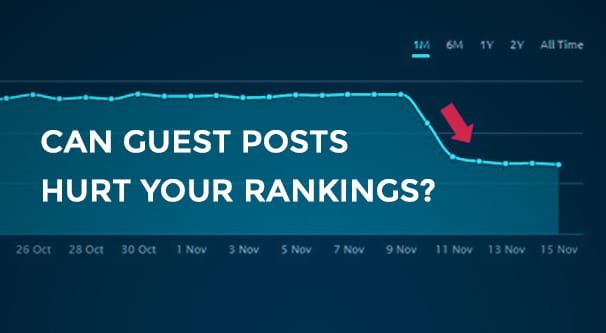
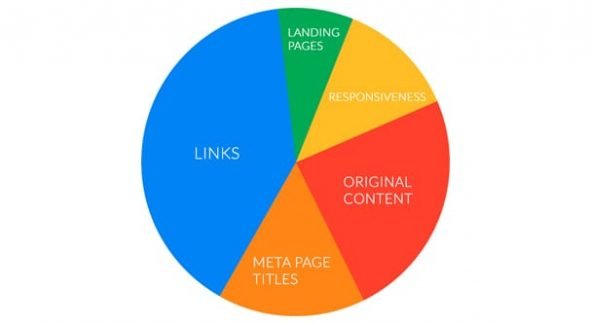
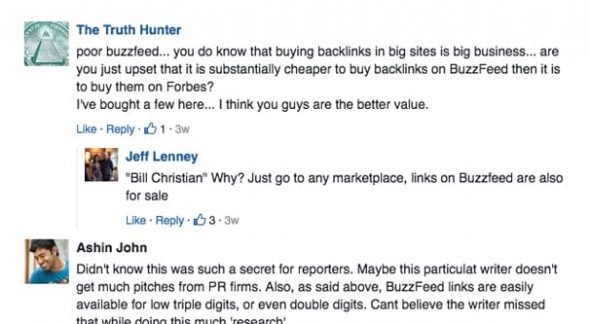
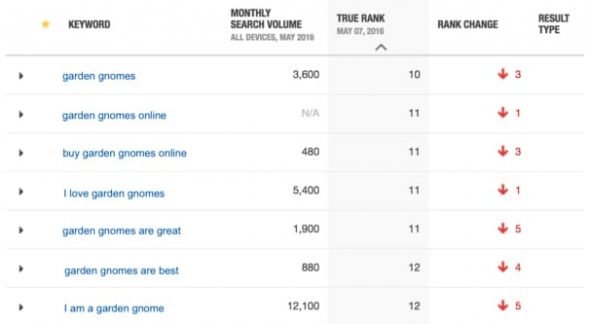
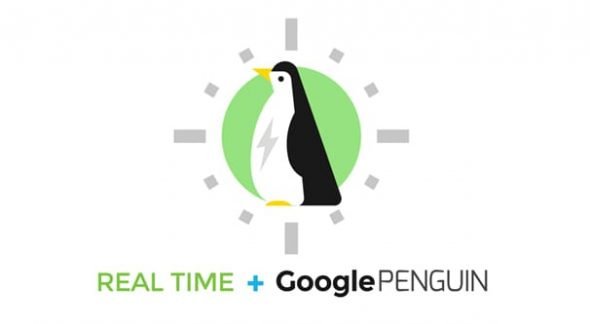
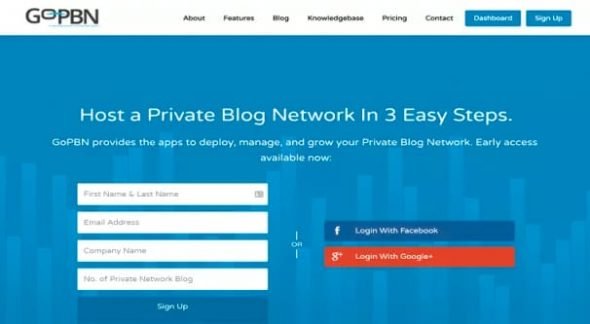



Nicholas
says:Thanks for the great post. I have a question. My site is 6 years old and have an average of 9,000 organic traffic monthly. However, I notice that after I bought a Wikipedia link in May and my ranking for major keywords on home page dropped 5 – 10 in position. It took around two months to recover. I bought another high authority link from a Google News site recently the ranking of main keywords are dropping again for the last 10 days. So far the position declined by 3 – 5 spots. Are you able to share the reason?
James Parsons
says:Hi Nicholas! What day did your rankings drop? The June core update was around June 3rd, there’s a chance your website was affected by this. It could be that those two links are perfectly fine (especially the Wikipedia link, that wouldn’t have done anything) and your issue lies elsewhere.